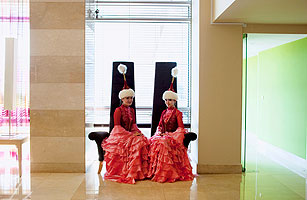
Culture Clash Kazakh women in traditional dress in an Atyrau hotel that is popular with expat oil workers
(2 of 3)
But money is just part of the equation. China is leveraging its growing clout in neighboring Kazakhstan to put pressure on the tens of thousands of ethnic Uighurs who over the decades have fled across the border from Xinjiang to escape persecution by the Chinese. Central Asia's latest Great Game thus has it all: intense competition among three big powers, high stakes for natural resources and communal strife. But there is little question about who is now ahead in the game. Says Nurlan Keikin, the managing director for capital construction and reconstruction at the Atyrau refinery: "We all know the future is China's."
The Chinese Connection
Since President Nazarbayev turned an outpost on a windswept steppe into Kazakhstan's new capital in 1997, Astana has grown with an astonishing architectural exuberance. The Finance Ministry is shaped like a giant dollar sign. On one block I pass a Korean-style edifice, a Swedish beer hall and a collection of yurts, the traditional tents used by Kazakhs. There is a Nazarbayev University. And reinforcing China's place in the city is the Beijing Palace — a Chinese-roofed hotel tower, complete with a revolving restaurant — that would look perfectly at home on the Avenue of Eternal Peace.
Beijing's influence on Kazakhstan is still not as pervasive as Moscow's. After the long years of Russian domination, one-third of Kazakhstan's population is ethnically Russian. Many Kazakhs speak Russian to each other, despite Kazakh language instruction in school. Nevertheless, it is the incursion of China, the populous behemoth to the east, that is raising nationalist hackles, not the specter of Russia. In May, Kazakhstan's biggest opposition party sponsored a hundreds-strong demonstration against China. Protesters were riled by rumors that Kazakhstan might lease land to Chinese farmers; posters at the rally depicted a Kazakh yoked to a plow helmed by a Chinese mandarin.
Throughout my travels in Kazakhstan I hear tales of an invading Chinese horde. Some local NGOs estimate that half a million Chinese have descended on this sparsely populated land. I see no evidence of such numbers, and the Kazakh Ministry of Labor and Social Protection has set quotas limiting the number of foreign workers in Kazakhstan. But a 2009 U.S. embassy cable from Astana released by WikiLeaks reported, "Once Chinese companies sign a contract, they 'close the circle,' bring in their own personnel and equipment — often illegally — and control the project tightly, under close supervision from Beijing. A Chinese Embassy official ... acknowledged that Chinese companies sometimes violate Kazakhstan's immigration and customs laws."
So where are all those Chinese? I finally find one group living in a concrete box atop the roof of the Golden Dragon restaurant and hotel in downtown Almaty, Kazakhstan's biggest city. Chef Yang isn't here for the adventure. "I'm in Kazakhstan for one reason only — money," he says. From his spartan barracks, which he shares with several other Chinese, I can see the snowcapped Tian Shan Mountains, the celestial peaks straddling the borders of China, Kazakhstan and Kyrgyzstan. Does he find them pretty, I ask? He shrugs. "When I'm up here I'm too tired to look at them," he says, buttoning up his chef's whites. "I have to go to work now."
The Uighur Question
Others have weightier things on their minds. In a tidy residential part of Almaty, I catch sight of a flag on a car dashboard: a Muslim crescent and star on a sky-blue background. It is the flag of East Turkestan, the short-lived, self-proclaimed republic (1933 — 34 and 1944 — 49, by history's most generous estimation) of the Uighur people who are spread across what is now the Xinjiang autonomous region. Today, the Uighurs are losing out, even outside their ancient homeland. No longer able to gain licenses from the government, Uighur activists in Kazakhstan cannot publicly convene to discuss political issues. That East Turkestan flag I saw? Displaying one can result in police harassment. "My family and I escaped China in 1962 after a massacre in my hometown," says Usanzhan Hassan, 68, a Uighur who was born in Xinjiang and now lives in Almaty. "I never thought the Chinese would become powerful enough to control us even outside of their territory."